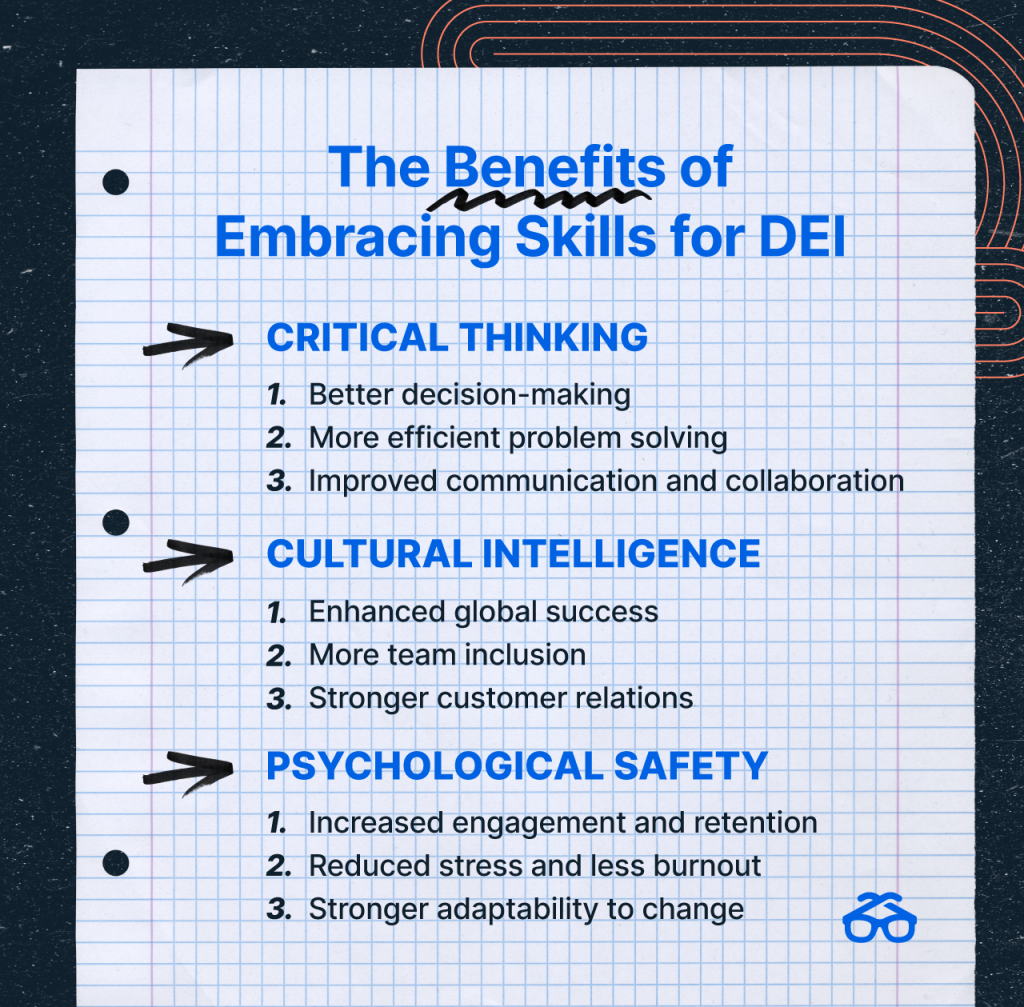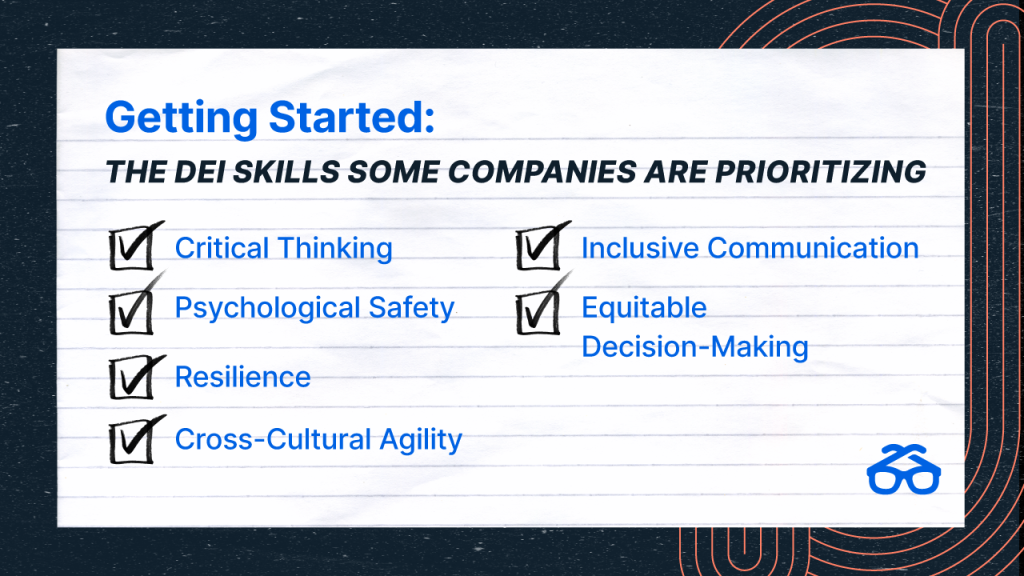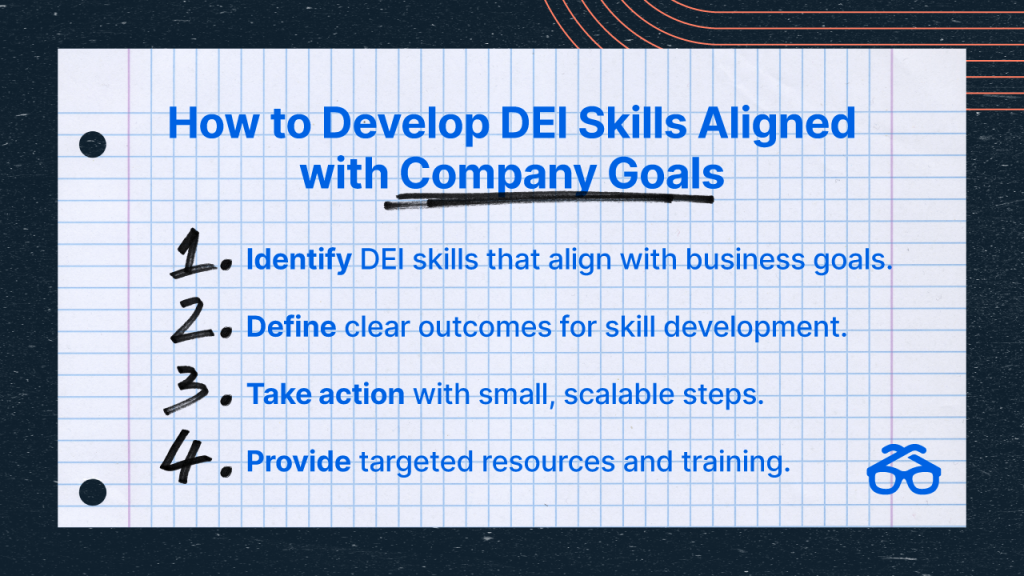This is the second post in a series on building skills for Diversity, Equity, & Inclusion (DEI). See the first.
DEI skills—such as critical thinking, cultural intelligence, and psychological safety—are no longer optional; they’re essential to a thriving, resilient organization that can adapt to rapid change.
By developing DEI skills, leaders and employees can create inclusive environments where diverse perspectives thrive, fostering a culture of belonging that boosts resilience, engagement, and innovation. Key DEI skills bridge the gap between rapid technological advancements and the human connection needed for collaboration—and they might just prove essential in helping your organization meet its most important objectives.

Organizations looking to navigate periods of significant change need DEI skills to remain agile and resilient. Navigating change means more than responding to technology shifts; it’s about ensuring your people are equipped to thrive in an inclusive, fast-paced environment.
As periods of change become the norm, prioritizing DEI skills is key for organizations to stay competitive and agile. Whether it’s enhancing knowledge sharing or building resilient teams, focusing on DEI skills is the path to a truly adaptive, inclusive, and thriving workplace.
The Leader’s Role in DEI Skill Development
Leaders in particular play a crucial role in championing DEI skills. Why? Leaders empower individuals and managers to support inclusive practices and create a culture of belonging that drives engagement, grit, and resilience at a time when people need it most. Executive Leaders can prioritize DEI skills to foster an environment where psychological safety and diverse perspectives drive growth.
Engaging managers and leaders in DEI skill conversations begins with equipping them to act as skill coaches, fostering open dialogue and modeling inclusive behaviors. This process involves providing targeted training and tools to help leaders recognize and mitigate bias, facilitate psychological safety, and encourage diverse perspectives within their teams.
By embedding DEI into regular performance discussions and aligning it with business goals, managers can actively support their teams’ growth while driving a culture of inclusion and belonging.
Choosing DEI Skills to Prioritize at Your Organization
As you assess which DEI skills need attention at your organization, let’s explore a few examples to get you started.
Remember that skills should be measurable and developable.
You might be tempted to choose skills like compassion or empathy. These are important, but under scrutiny they’re revealed as inherent human traits. In other words, how can an employee get better at empathy? On the contrary, DEI skills allow for the evaluation of proficiency and improvement over time. To find out more on this, take a deeper dive into skills vs. competencies.
Key DEI skills and the benefits they offer include:
- Critical Thinking. This helps employees recognize and address biases, question assumptions, and make fair, reasoned decisions that align with inclusive values. It helps them understand how best to utilize and evaluate AI tools. It’s not only about problem-solving; it’s essential for uncovering and addressing unconscious biases in decision-making and enabling fairer, more inclusive practices.
- Psychological Safety. This is about creating an environment where individuals feel secure sharing ideas without fear of judgment, and it’s vital to inclusion. Psychological safety builds trust and encourages diverse perspectives, allowing innovation to flourish while creating a foundation of trust and respect. Psychological safety is pertinent to all levels of an organization.
- Resilience. This is the ability to adapt to challenges and recover from setbacks. It supports employees as they navigate change, including shifts toward greater equity and inclusion. Resilience is about equipping teams to thrive even during difficult times, which is essential for fostering a workforce that remains engaged and supportive.
- Cross-Cultural Agility. This is about understanding and adapting to diverse perspectives in a way that drives better team collaboration. It helps individuals work productively across different backgrounds, enhancing communication and collaboration.
- Inclusive Communication. This involves learning techniques to actively listen, mitigate biases, and foster open dialogue. Inclusive communication allows for better understanding among team members and creates an environment where all voices are heard and valued.
- Equitable Decision-Making. This involves systematically ensuring fairness in processes like hiring or promotions through choices that are both inclusive and unbiased. Equitable decision-making lays the groundwork for fair practices that help attract and retain a diverse workforce.

Each of these skills is developable, actionable, and measurable. The important action is identifying skills to develop that are essential to DEI as well as accomplishing your company’s goals.
How to Develop DEI Skills Aligned with Company Goals
Rather than viewing DEI as a standalone initiative, savvy organizations will recognize that DEI skills are directly tied to broader business objectives—for example, boosting innovation, increasing employee engagement, or improving customer satisfaction.
Step No. 1: Identify DEI skills that align with business goals.
Start by identifying a few essential DEI skills that align with your company’s strategic objectives. For example, if your goal is to foster innovation, focus on skills like creativity and cultural awareness, which support diverse thinking and collaboration. If the goal is to improve team resilience during times of change, prioritize skills like psychological safety and adaptability.
Step No. 2: Define clear outcomes for skill development.
It’s essential to clearly define what success looks like. Do you need employees to gain deep proficiency in one area, or is a broader understanding of multiple skills more valuable? Asking for both breadth and depth can lead to burnout, so keep the focus on a few key skills and make sure progress is measurable. This specificity will also help you track progress and make adjustments as needed.

Step No. 3: Take action with small, scalable steps.
Don’t wait for perfect data or a lengthy approval process to get started. Quick wins like engaging employees in discussions about skills or launching targeted training programs can build momentum. Analyzing employee skill profiles, for instance—to identify gaps in psychological safety or cultural awareness—might quickly help you pinpoint where to start. This in turn could help make your overall implementation process more responsive and agile.
Step No. 4: Provide targeted resources and training.
Asking employees to develop DEI skills without adequate resources is a recipe for failure. Ensure they have access to workshops, peer-to-peer learning groups, stretch assignments, and learning content that supports their growth. Be wary of blanket training programs, as these often lack the focus necessary to address specific skill gaps. Instead, opt for tailored learning experiences that address your organization’s unique needs.
A Note About Creating Lasting, Measurable Mentorship Programs
A mentorship program is a wonderful tool in the DEI toolbox. But if it’s your only tool, you’ve made a mistake. While many mentorship programs created during the DEI push of 2020 had good intentions, they often lacked long-term sustainability. To create lasting impact, mentorship initiatives must have clear goals and ongoing support.
Leaders should be accountable for fostering inclusive cultures and providing mentorship aligned with measurable outcomes. Specific skills tied to a program can help define clear goals. By establishing structured, goal-oriented mentorship that complements other DEI initiatives, organizations can sustain DEI momentum and build a stronger, more inclusive talent pipeline.
The Measurable Impact of DEI Skills
Organizations that invest in DEI skills are building a foundation for sustained performance and adaptability, creating a workforce that’s not only more diverse but also more agile, innovative, and resilient. Integrating DEI skills into company strategy isn’t just about “checking a box.” It’s about making an investment in the long-term health and competitiveness of your organization.
With the right DEI skills in place, your organization is better equipped to navigate change, embrace diverse perspectives, and drive lasting progress.
Degreed Professional Services
Hali Linn is a Learning Strategy Consultant on the Degreed Professional Services team.
Degreed Professional Services partners with business leaders and learning pros to explore learning strategies, technology goals, and questions. Book a free and private consultation.

